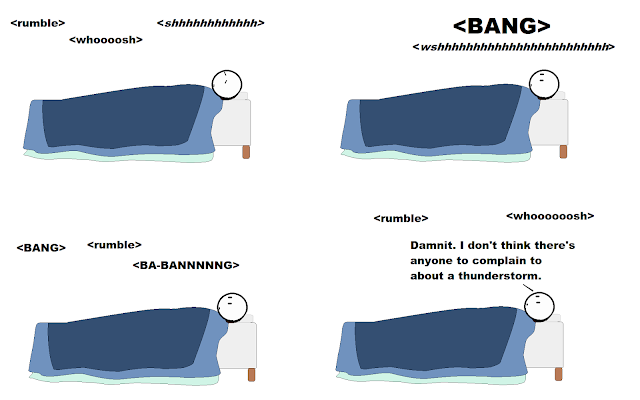Saturday, July 30, 2022
Thursday, July 28, 2022
Language Of Confusion: Scorched
I can’t imagine what put me in the mind of etymologizing words related
to what happens when it’s very, very hot outside.
Scorch itself showed up in the early fourteenth century as scorchen. Its history before that is kind of a question mark, though it might be related to the word scorcnen, which is make dry or singe, and is another word we don’t know the origin of—it might be from the Old Norse skorpna, to be shriveled, but who knows? Not us. Funnily enough, there was actually another version of scorchen in English meaning to strip the skin off of, but that one is separate, and isn’t used at all anymore. Which is too bad, really.
Dry comes from the Middle English drie, from the Old English dryge, which is dry with a g added to it. Before that, it’s from the Proto Germanic draugiz and the Germanic root dreug-, which all just mean dry. Drought of course is related, coming from the Old English drugaþ. It’s literally dry with the -th suffix (like the end of depth or strength) at the end. And for some reason, they kept the g even after they stopped pronouncing it.
Another one with no date attached, thirst comes from the Old English þurst, and if you remember that þ is just th, then you’ll realize the word is just thirst. It comes from the Proto Germanic thurstu-, which is traced back to the Proto Indo European ters-, to dry. I’ll have to etymologize words descended from that one, because there are a lot of them, some quite amusing.
Parch showed up in the late fourteenth century, but its origin is uncertain, because words related to drying out apparently fall out of thin air. One thought is it comes from parchment, and, I mean, parchment is dried, isn’t it? You’d really think they have to be related, but it’s etymology. Who knows?
Desiccate showed up in the mid sixteenth century from the classical Latin desiccatus, dried, and its verb form desiccare, to dry up. The de-, means thoroughly here, and siccare is to dry, so the word is to really dry. About time one of these words made sense.
Online Etymology Dictionary
Google Translate
Omniglot
University of Texas at Austin Linguistic Research Center
University of Texas at San Antonio’s page on Proto Indo European language
Tony Jebson’s page on the Origins of Old English
Old English-English Dictionary
Tuesday, July 26, 2022
From The Spamfiles
Ah, spam. So reliably stupid.
I think the most offensive part of this is the
n-apostrophe-going. That’s just obscene.
What does my horoscope hold in the next month? In other
words, this is a horoscope for my horoscope.
I’m just impressed that she’s consistent about the name.
Most of them don’t even bother.
They mean a computer virus designed to copy all your
personal information. It is, as they claim, totally free.
Normally it’s suspicious to have a new follower with a
string of numbers after their name who’s just joined the site in the past
month, but he Am handsome.
Saturday, July 23, 2022
Under Control
I definitely should not see people before I’ve done my hair.
It feels soooooo much better. But yeah, I do look total Bride Of Frankenstein when I first wake up.
It feels soooooo much better. But yeah, I do look total Bride Of Frankenstein when I first wake up.
Thursday, July 21, 2022
Language Of Confusion: -Ceed, Part III
The final part looking at the words that come from Proto Indo European ked-,
to go or yield. Will they be weird or
disappointingly boring? Let’s find out.
First, the last actually has -cede in it: precede. It showed up in the
early fifteenth century, coming from
the Old French preceder and classical Latin praecedere,
to go ahead/before.
Prae is literally Latin for before, and cedere means to go or to yield and is what comes from ked-. So to precede is to go before.
Next we’re going back to the -cease/-cess words. Decease showed up in
the early fourteenth century, coming
from the classical Latin decessus, departure.
Basically, it was their soft way of saying someone was dead. It’s from the verb
decedere, to depart,
with the de- meaning away, making this
word “to go away”. Or to die if there are little kids around and you don’t want
to freak them out. Interestingly—well, kind of—predecessor has retained the
more literal meaning of the word. It showed up in the late fourteenth century meaning what we know it as, the person who precedes you. It comes from the Old
French predecesseor and Late Latin praedecessorem, a mix of prae-, which you know means before,
and decedere. A predecessor goes away before you.
Ancestor showed up in the fourteenth century from the Old French ancestre/ancessor. Before that, it was the Late
Latin antecessor, a mix of ante (from the Proto Indo European ant-,
meaning before) and cedere, to go. An
ancestor is someone who goes before you. I can see why they dropped the te,
though. “Antecestor” just sounds awkward to say.
Next, abscess, which… just ew. It showed up in the early seventeenth century in medicine. It comes from
the classical Latin abscessus, which means abscess and comes from the verb abscedere, which means… to retire.
Really, it’s a mix of ab-, off or away from,
and cedere, so the word is “to go away from”, as in retire. And an abscess is
called that because back then people thought “humors” went from the pus in the
swelling.
Finally, incessant showed up in the mid fifteenth century,
coming from the Old French incessant and Late Latin incessantem.
The in- means not here, and the rest is
from cessare, to cease, which I’m pretty sure I mentioned last week as being the frequentative of cedere. Incessant literally means “not going away”. Seems
strangely appropriate to end this post on this note.
Tuesday, July 19, 2022
From The Spamfiles
I do love easy posts.
There’s a lot that’s straight up suspicious about this, but
the only thing that really bothers me is that there’s a period after every
letter in “PayPal” but the L.
Four point five million??? Oh, wait it’s “used compensation”.
That’s no good.
I do want a free knife, but I’m not going to lie, I’m
worried about the fact that it seems to be knocking.
They could almost pass for a real person if their email
address didn’t have a completely different name than the name they use in the message.
I guess their scam is getting me to email them back because we’ve both been signed
up for some Zombie porn and sex meet site against our wills. Which, ugh, that’s
probably a real thing out there somewhere.
Saturday, July 16, 2022
Ahhh! A Bug!
Everything she sees is a
potential bug.
It was a piece of a cricket, of course. Those things are always falling apart.
It was a piece of a cricket, of course. Those things are always falling apart.
Thursday, July 14, 2022
Language Of Confusion: -Ceed, Part II
Part two of the words that come from the Proto Indo European ked-,
to go or yield. Some of these words
make sense. Some… not so much.
First, cease. It showed up in the fourteenth century,
coming from the Old French cesser and classical Latin cessare,
to put an end to (or, you know, cease). That’s actually from another verb, cedere, to give up or yield, and which we spoke of last week as being from ked-. Well, I guess if
you cease doing something, you yield to not doing it? Does that sentence even
make sense?
Next we’ll be looking at a bunch of words that have both -cede and
-cess versions. Recede showed up in the early fifteenth century,
while recess showed up in the mid sixteenth century, though back then it meant
the act of receding, then meaning hidden/remote come the early seventeenth
century. Not really sure how receding came to mean hidden, but that formed into
meaning “receding into private chambers”, which became a niche (or receding
space) in the late seventeenth century, and then in the early nineteenth
century, a “place in recess”, as in, people not there. That was a weird
journey. Recession is definitely a lot closer to recede than recess is now.
Anyway, recede came from the Old French recede, recession from the
modern French recession,
and all three words come from the classical Latin recedere (withdraw),
recessus (withdrawal),
and recessionem (also withdrawal),
the latter two just being different tenses of recedere. Re- means back,
so the word is to give back? To yield back? Well, it kind of makes sense. Not
the recess part, though.
Will concede make more sense? Probably not. It showed up in the mid seventeenth century, though
concession showed up earlier, in the mid fifteenth century.
Concession is from the Old French concession and classical Latin concessionem,
just concession,
and concede is from the French concéder and the root verb, the classical
Latin concedere, to concede.
The con- prefix is thought to just be
intensive here (as in, just for emphasis), so to concede is to really
yield. Huh, I guess I was wrong. It actually does make sense. Well, there’s a
first time for everything.
Finally today we’ll look at accede, and the far more common access.
Accede showed up in the early fifteenth century,
while access beat it out by nearly a century and showed up in the early fourteenth century. Access is from the
Old French acces and classical Latin accessus, which means
something like approach,
while accede comes from the Latin accedere, to approach.
The prefix is from ad-, which means to,
so to accede is to approach to. Well, approaching is required for accessing
something, I guess. Also, fun fact, access didn’t show up as a verb until 1962,
and was associated with computing. If you ever write something set before then,
don’t use to access!!!
I just found that really funny.
Sources
Online Etymology Dictionary
Google Translate
Omniglot
University of Texas at Austin Linguistic Research Center
University of Texas at San Antonio’s page on Proto Indo European language
I just found that really funny.
Online Etymology Dictionary
Google Translate
Omniglot
University of Texas at Austin Linguistic Research Center
University of Texas at San Antonio’s page on Proto Indo European language
Tuesday, July 12, 2022
From The Spamfiles
Spam never disappoints. Mostly because something so stupid
can’t really be disappointing.
Huh, apparently I’m sending these to myself. I know I always
have to say “ATTN VICTIM” in order to get my attention. Otherwise how would I
know?
Wow. It literally starts by telling me I can regrow my lost
hair and in the same line goes into telling me I can restore my hearing, like
it forgot which scam it was trying to pull on me mid sentence.
I had to use Google Translate to figure out what language it
is—Slovak, a language I do not speak, but with the word “investovat” in there,
I think I can figure out what they’re after. And spoiler alert, I was right.

Okay, first of all, I can’t begin to describe how detestable
I find that, second of all, eliminate???? That’s just concerning.
I do believe it’s important to keep things accessible for
screen readers in the like (actually, I should be more conscientious about it
and start putting in image descriptions). But of course I’m distracted by the
fact that I don’t even have “timeanddate.com” anywhere on my blog.
Saturday, July 9, 2022
Thursday, July 7, 2022
Language Of Confusion: -Ceed, Part I
Ah, another multi-parter. I never learn. This time, it’s words that
have -ceed in them (obviously), as well as -cess, since they’re usually
related.
The root of all these words is cede, to yield or give way to. It showed
up kind of late, in the early-mid seventeenth century,
coming from the French céder, to sell,
and classical Latin cedere, to give up. Huh, you give up something you sell, so pretty consistent definition, actually. Anyway, cedere comes from the Proto Indo European ked-,
to go or to yield. Okay, it’s really
consistent.
Succeed showed up in the late fourteenth century,
while success didn’t show up until the sixteenth century,
and interestingly they both originally meant to come next after (as in one
person succeeding another) or an outcome, not meaning to be successful until
the nineteenth century. Their origins are pretty much the same, as succeed
comes from the Old French succeder and classical Latin succedere (to succeed),
while success comes from the Latin successus (success),
the noun form of succedere. That word is actually a mix of the prefix sub-,
meaning next to or after here, and cedere,
making it to yield after. Makes sense for the original definition of succeed, I
guess.
Next, exceed showed up in the late fourteenth century, from the Old French exceder
and exces, respectively. Much like success, excess comes from the
classical Latin excessus,
and that, like exceed, is from the verb excedere, which actually means
to leave.
One of the other definitions of cedere is to go, and mixed with the prefix ex-,
out, the word is to go out. And that
morphed into meaning to go beyond.
Proceed showed up in the late fourteenth century—after
process, which showed up in the beginning of the century.
It’s pretty much the same origin as the previous two words, from the Old French
proceder, classical Latin processus,
from the verb procedere, to proceed.
The pro- comes from the Proto Indo European per-, forward,
making to proceed “to go forward”, while process is the act of carrying
something on. These origins can get very formulaic, can’t they?
Finally today, necessary. It showed up in the mid fourteenth century,
but back then it was a noun meaning something needed before it became the
adjective we know it as today. It comes from the Old French necessaire,
from the classical Latin necessarius, which is also just necessary,
and actually has a shorter noun form, necesse.
The prefix here is the little used ne-, from the Proto Indo European root
meaning not, making the word something not
yielded to. Because, you know, it’s necessary.
That’s all for now. There will be more fun next week!
Sources
Online Etymology Dictionary
Google Translate
Omniglot
University of Texas at Austin Linguistic Research Center
University of Texas at San Antonio’s page on Proto Indo European language
Online Etymology Dictionary
Google Translate
Omniglot
University of Texas at Austin Linguistic Research Center
University of Texas at San Antonio’s page on Proto Indo European language
Tuesday, July 5, 2022
July Goals
Ugh, this again.
June Goals
1. Get to work on more beta reads, as well as the notes from them.
Hey, what do you know, I did this. There are still some rewrites I have to get to, though.
2. Figure out what I want to do
with my latest WIP, as it’s definitely not what I want it to be.
Did not do this, whoops. I was too busy working on my latest shiny new distraction.
3. Try to do something with the
query, synopsis, and all that. Man, I wish I could have someone do it all for
me.
Surprisingly, I did do some work on this. It’s a miracle!
Pretty successful, I guess. In all, June was a pretty busy
month outside of writing, and oh my god, the road construction outside my house
that goes on all night will never stop.
Anyway, July.
July Goals
1. Continue working on notes from beta reading (still could use more!). Not sure about some parts of it, but I do know a few things that need to be done.
2. Get my latest project underway. If it actually goes well,
I’ll have to tell you about it.
3. [Heavy sigh] Update my etymology page. I hate what a
chore this has become thanks to New Blogger.
I think I’ll be able to complete this month’s goals, though the
etymology page may make me punch a hole in my computer. What do you want to do
this month?
1. Get to work on more beta reads, as well as the notes from them.
Hey, what do you know, I did this. There are still some rewrites I have to get to, though.
Did not do this, whoops. I was too busy working on my latest shiny new distraction.
Surprisingly, I did do some work on this. It’s a miracle!
1. Continue working on notes from beta reading (still could use more!). Not sure about some parts of it, but I do know a few things that need to be done.
Labels:
beta reads,
goals,
July Goals,
WIP,
writing,
writing goals
Saturday, July 2, 2022
Transposed
Seriously, this happened. Not the first time the water was
shut off, but the second.
Kind of a big error to make.
Kind of a big error to make.
Subscribe to:
Posts (Atom)








